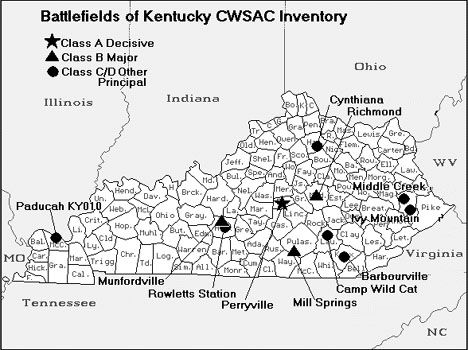Battles in Kentucky |
|
In 1861 and 1862, Kentucky saw a number of battles and skirmishes. By the end of 1862, after the battle of Perryville, Confederate forces retreated from the state. But the destruction caused by war was not over for Kentuckians. From December 1862 to January 1865, famous Confederate raids by John Hunt Morgan, Nathan Bedford Forrest, Quantrill, and "Sue" Mundy destroyed Union supply depots, bridges, county courthouses, and people's personal property. Kentucky also experienced a period of lawlessness in 1864, when "Bushwhackers" -- small bands of unruly soldiers from both sides -- looted small towns and robbed local farmers of produce and livestock.
When President Lincoln issued the Emancipation Proclamation in January of 1863, all slaves in the Confederacy were legally set free. Because Kentucky remained in the Union, slaves in this state were not free. Lincoln declared in 1864 that any slave who enlisted in the Union army would be given freedom as well as the freedom of his family. A flood of Kentucky slaves rushed to Camp Nelson to enlist. Soon, the camp in southcentral Kentucky became a recruitment center for "coloured" troops, as well as a refugee center for their families.
The Civil War ended in 1865, and Kentucky slaves were legally freed when the 13th Amendment to the Constitution of the United States was ratified soon afterward. But Confederate sentiment was still high in Kentucky after the war. The Kentucky General Assembly failed to ratify either the 13th Amendment; the 14th, which gave equal protection under the law to blacks; or the 15th, which gave African Americans the right to vote.
SOURCE:Overview of the Civil War in Kentucky
|
|
||
|
Evans, Clement A. Confederate Military History - Kentucky Volume |
$25.00 
|
$15.00 
|
|
Rigdon, John C. The Civil War in Kentucky |
$35.00 
| |

|
|
Ordering via EMAIL is easy. Click Here |
Orders may also be sent via U.S. Snail to:
Eastern Digital Resources
5705 Sullivan Point Drive
Powder Springs, GA 30127
Tel: (803) 661-3102
You may use this search feature to search either ResearchOnLine or the entire WWW. Google has indexed approximately 22,600 pages on this site.
______________________________


